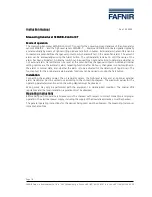
Ethernet Media
4-2
Cabling Types
Figure 4-1. AUI Cable Configurations
The reason for the configuration of AUI cables as Male to Female only is due to
their intended use. AUI cables are designed to attach transceivers to workstations
or other active network equipment. Transceivers require power to operate, and
that power is supplied either by an external power supply or by a pair of wires
dedicated to power in the cable. A Male/Male or Female/Female AUI cable does
not correctly supply power and grounding to the transceiver. If you use a
Female/Female AUI cable between two transceiver devices, both transceivers will
try to draw power from each other. Neither is capable of providing this power.
Therefore, this configuration will not function. Likewise, two AUI device ports
should never be directly attached without using transceivers.
Standard
The gauge of the internal wires that make up the cable determines the thickness
and relative flexibility of the AUI cable. Standard AUI cable (containing pairs of
AWG 20 or 22 wire) is capable of reaching a maximum distance of 50 meters
between transceivers and the network device, but is thick, (0.420 inch) and
somewhat inflexible.
Standard AUI cables, due to their bulk, are typically used in environments that
require the 50 meter distances that standard AUI cables can provide. In situations
where the workstations or networking equipment are close to the transceivers
they are to be connected to, Office AUI cable, being more easily managed and
more flexible, is often used.
NOTE
If you find yourself in need of a gender changer to connect a
device with AUI cable, you are doing something wrong.
NO
NO
YES
1845n01
Summary of Contents for 100BASE-FX
Page 1: ...Cabletron Systems Cabling Guide...
Page 2: ......
Page 4: ...Notice ii...
Page 22: ...Cabling Terms 2 8 Test Characteristics...
Page 54: ...Ethernet Media 4 30 Connector Types...
Page 72: ...Full Duplex Ethernet Network Requirements 6 8 Ethernet FOIRL Single Mode...
Page 80: ...Fast Ethernet Network Requirements 7 8 Hybrid Installations...
Page 130: ...FDDI Media 11 16 Connector Types...
Page 136: ...FDDI Network Requirements 12 6 TP PMD STP...
Page 170: ...Connecting and Terminating 14 20 FDDI...
Page 192: ...Index 4...
















































